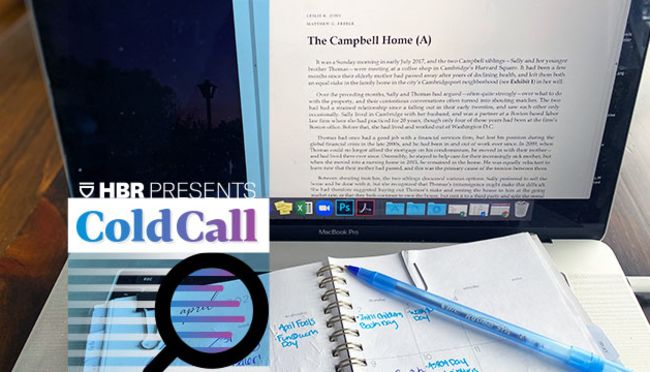Negotiation Tactics →
→

- 31 Mar 2020
- Cold Call Podcast
Controlling the Emotion of Negotiation
Leslie John discusses the importance of asking (and answering) the right questions when negotiating, particularly under emotional stress. Open for comment; 0 Comments.

- 08 Mar 2019
- Research & Ideas
Seven Negotiation Lessons from Amazon's HQ Disaster in Queens
After a lengthy courting process, Amazon thought its plan for a New York HQ campus was in the bag. But the company failed a primary goal of negotiations, says James Sebenius. Open for comment; 0 Comments.

- 15 Oct 2018
- Research & Ideas
Shaky Business: How Handshakes Win Negotiations
A handshake before a negotiation can have a surprisingly strong effect on the outcome, according to Michael Norton, Francesca Gino, and colleagues. Open for comment; 0 Comments.
- 05 Apr 2017
- Research & Ideas
For Women Especially, It Pays to Know What Car Repairs Should Cost
Consumers can negotiate cheaper auto repair prices by convincing service reps they know something about market rates—helping women overcome gender discrimination, according to recently published research by Ayelet Israeli and co-authors. Open for comment; 0 Comments.
- 05 Dec 2016
- Research & Ideas
How The 2016 Presidential Candidates Misled Us With Truthful Statements
Paltering, a subtle form of lying where an almost true statement is used, is not unknown in the world of politics. Here are several examples. Open for comment; 0 Comments.
- 05 Dec 2016
- Research & Ideas
How To Deceive Others With Truthful Statements (It's Called 'Paltering,' And It's Risky)
Presidential candidates do it. Business leaders do it. You probably do it, too. Paltering is a gentle form of lying, but is reviled by negotiators on the receiving end. Research by Francesca Gino, Michael Norton, and colleagues. Open for comment; 0 Comments.
- 25 Jan 2016
- Research & Ideas
When Negotiating a Price, Never Bid with a Round Number
Investors who offer “precise” bids for company shares yield better outcomes than those who offer round-number bids, according to research by Petri Hukkanen and Matti Keloharju. Open for comment; 0 Comments.
- 17 Sep 2014
- Sharpening Your Skills
Sharpen Your Negotiation Skills
Everyone negotiates, but few negotiate well. Here is a collection of Working Knowledge articles and faculty working papers that detail some of the the skills needed to negotiate successfully. Closed for comment; 0 Comments.

- 30 Jun 2014
- Lessons from the Classroom
The Role of Emotions in Effective Negotiations
Andy Wasynczuk, a former negotiator for the New England Patriots, explores the sometimes intense role that emotions can play in negotiations. Closed for comment; 0 Comments.
- 13 May 2013
- Research & Ideas
How to Spot a Liar
Key linguistic cues can help reveal dishonesty during business negotiations, whether it's a flat-out lie or a deliberate omission of key information, according to research by Deepak Malhotra. Closed for comment; 0 Comments.
- 07 May 2012
- Research & Ideas
The Art of Haggling
When teaching negotiation skills, many educators now focus almost exclusively on an interest-based approach in which both parties openly collaborate to find a mutually satisfying solution. Michael Wheeler argues that it's important for students to realize that there's also a time and place for old-school haggling. Closed for comment; 0 Comments.
- 03 Oct 2007
- Research & Ideas
Dealing with the ‘Irrational’ Negotiator
"Negotiators who are quick to label the other party 'irrational' do so at great potential cost to themselves," say HBS professors Deepak Malhotra and Max H. Bazerman. Their new book, Negotiation Genius, combines expertise in psychology with practical examples to show how anyone can improve dealmaking skills. In this excerpt, Malhotra and Bazerman describe what to do when the other party's behavior does not make sense. Open for comment; 0 Comments.
- 02 Oct 2006
- Research & Ideas
Negotiating in Three Dimensions
"Negotiation is increasingly a way of life for effective managers," say HBS professor James Sebenius and colleague David Lax. Their new book, 3-D Negotiation, describes how you can shape important deals through tactics, deal design, and set-up, and why three dimensions are more powerful than one. Here's a Q&A and book excerpt. Key concepts include: Three-D negotiation comprises tactics, deal design, and set-up. Their use depends on the nature of the barriers you face. A 3-D strategy is an aligned combination of set-up moves that occur away from the table, deal design moves, and tactics at the table, all designed to overcome the barriers you've identified. The best response to a barrier in one dimension may be moves within other dimensions. Closed for comment; 0 Comments.
- 08 Apr 2002
- Research & Ideas
How to Negotiate “Yes” Across Cultural Boundaries
Myriad factors can make or break a deal, according to Harvard Business School professor James K. Sebenius. As he explains in this excerpt from Harvard Business Review, the "web of influence" in many countries is more important than meets the eye. Closed for comment; 0 Comments.

The PGA Tour and LIV Golf Merger: Competition vs. Cooperation
On June 9, 2022, the first LIV Golf event teed off outside of London. The new tour offered players larger prizes, more flexibility, and ambitions to attract new fans to the sport. Immediately following the official start of that tournament, the PGA Tour announced that all 17 PGA Tour players participating in the LIV Golf event were suspended and ineligible to compete in PGA Tour events. Tensions between the two golf entities continued to rise, as more players “defected” to LIV. Eventually LIV Golf filed an antitrust lawsuit accusing the PGA Tour of anticompetitive practices, and the Department of Justice launched an investigation. Then, in a dramatic turn of events, LIV Golf and the PGA Tour announced that they were merging. Harvard Business School assistant professor Alexander MacKay discusses the competitive, antitrust, and regulatory issues at stake and whether or not the PGA Tour took the right actions in response to LIV Golf’s entry in his case, “LIV Golf.”